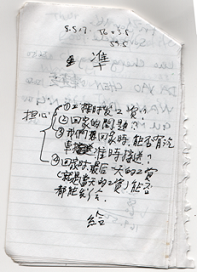In light of the recent tragic incident involving the death of 10 migrant workers in Southern Ontario, I felt it was finally time to take the wraps off of a journal I kept during a two-week trip in early 2004 to investigate the conditions of undocumented Chinese migrant farm workers. I hope this can help shed light on the kinds of conditions faced every day by the people who tend, pick and process the food we eat.
This is the sixth in a series. See here for the first entry.
The families of the deceased and injured are very much in need of financial and logistical support. As such, a fund has been set up so that donations may be made to them. At the same time, a sustained, organized, well-informed effort is needed to prevent similar tragedies. Please consider supporting groups like Justice 4 Migrant Workers and joining migrant farm worker advocates in calling for greater accountability and compensation.
—
Morning comes. As we prepare for whatever the day may bring, the contractors arrive and tell us that we won’t be working today, since we’ve refused to move to the other greenhouse. I explain why we refused to move, but they tell me that there’s work if I can find a few workers to come work at the other greenhouse. There are others eager to work, so some of us do go to the new greenhouse. It is just a day stint and we’ll get paid at the end of the day. Those I’ve been working alongside most regularly decide to stick together and instead catch a ride into Windsor for the day.
It feels strange to break rank with my colleagues, but because others want to work, I’m again put in a position where I feel others’ employment depends on my action. It later occurs to me that I’ve perhaps too easily misled myself into that dilemma: farm labour is physically intensive and requires some skill, but the work would be allocated whether I agreed to partake or not.
Regardless, in the hustle I agree to return for another day at the greenhouse, with a new crew. The owner pressures me to convince my cohorts to stay on for at least another week to finish the work he needs done. He doesn’t want to re-train yet another new crew. I explain to him that most of us are unhappy with the contractor, and hint at the pay problems that have come up. It’s news to him, he says, and he offers to hire us directly — to cut out the middleman — but before long talks himself out of it. He realizes he needs to maintain a positive relationship with the contractor who has brought us here, which makes sense when I recall having overheard him complain how he was totally held ransom to the labour contractor until “his” Mexicans arrive in the springtime.
Still, he’s looking for solutions. He offers to call our contractor and tell him that he really likes us and would like for us to stay, but want to know why his workers don’t seem to want to stay — to light a fire under the contractor, and to perhaps prompt him to make our lives a little easier. I nod my head with a minimum of enthusiasm. There’s no sense in refusing the gesture, but I don’t expect it to ensure our pay arrives promptly if we have to stay here.
The day’s labour goes smoothly and is relatively easy. The cucumber plants are growing rapidly, reducing the amount of work we have to do bent over.
When we return to the main greenhouse after work the contractors tell us that we’re being sent home for refusing to relocate. I pack my belongings, place a few calls to local contacts and to friends and family, and anticipate the prospect of writing about this past week and finding some closure.
The glow of closure doesn’t last long, however. Two of my colleagues, the elders of the group I’ve worked with the most, approach me and tell me that they’re not leaving and want me to stay. They’ve been promised easy work, and have negotiated for me to be included as well. I remain stolid: my decision has been made, my heart is in its place, my family expects me, and so on. But then my newest workmates also implore me to stay, at which I find myself placing a new round of calls to my contacts, friends, and family.
I feel emotionally and mentally drained as I struggle to adapt to the continual, unpredictable logistical machinations of this line of work.
At the same time, it’s a climate I’m learning to expect. I unpack my bag, my mind, and rest before another day of work.
Aylwin Lo (@aylwinlo) was a Labourer-Teacher with Frontier College in 2003, and an Into The Fields intern with Student Action with Farmworkers in 2006. He has volunteered with Justice for Migrant Workers and currently resides in Toronto, where he integrates varying combinations of technology, graphic design, and politics.



